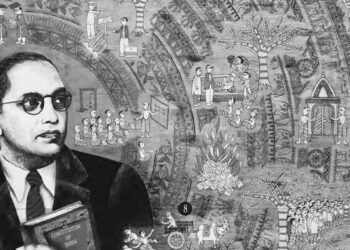Continuation….
“Wives who belong to Sudra, Vaisya, Kshatriya or Brahman caste, and who have not given birth to children, should wait as long as a year, two, three and four years respectively for their husbands who have gone abroad for a short time; but if they are such as have given birth to children, they should wait for their absent husbands for more than a year. If they are provided with maintenance should wait for twice the period of time just mentioned. If they are not so provided with, their well-to-do gnatis. should maintain them either for four or eight years. Then the gnatis should leave them to marry, after taking what had been presented to them on the occasion of their marriages. If the husband is a Brahman, studying abroad, his wife who has no issue should wait for him for ten years; but if she has given birth to children, she should wait for twelve years. If the husband is a servant of the king, his wife should wait for him till her death; but even if she bears children to a savarna husband (i.e. a second husband belonging to the same gotra as that of the former husband), with a view to avoid the extinction of her race, she shall not be liable to contempt thereof (savarnatascha prajata na pavadam labheta). If the wife of an absent husband lacks maintenance and is deserted by well-to-do gnatis, she may re-marry one whom she likes and who is in a position to maintain her and relieve her misery.”
Unlike Manu every precaution was taken to guarantee economic independence to a married woman. This is clear from the following provisions in Kautilya’s Arthashastra relating to wife’s endowment and maintenance:
“Means of subsistence (vruti) or jewellery (abadhya) constitutes what is called the property of a woman. Means of subsistence valued at above two thousand shall be endowed (in her name). There is no limit to jewellery. It is no guilt for the wife to make use of this property in maintaining her son, her daughter-in-law, or herself. whenever her absent husband has made no provision for her maintenance. In calamities, disease and famine, in warding off dangers and in charitable acts, the husband, too, may make use of this property. Neither shall there by any complaint against the enjoyment of this property by mutual consent by a couple who have brought forth a twin. Nor shall there be any complaint if this property has been enjoyed for three years by those who are wedded in accordance with the customs of the first four kinds of marriage. But the enjoyment of this property in the cases of Gandharva and Asura marriages shall be liable to be restored together with interest on it. In the case of such marriages as are called Rakshasa and Paisacha, the use of this property shall be dealt with as theft. Thus the duty of marriage is dealt with.”
“A woman who has a right to claim maintenance for an unlimited period of time shall be given as much food and clothing (grasachhadan) as is necessary for her, or more than is necessary in proportion to the income of the maintainer (yatha-purushaparivapam va). If the period (for which such things are to be given to her with one-tenth of the amount in addition) is limited, then a certain amount of money, fixed in proportion to the income of the maintainer, shall be given to her; so also if she has not been given her sulka, property, and compensation(due to her for allowing her husband to re-marry). If she places herself under the protection of any one belonging to her father-in-law’s family (svasurkula), or if she begins to live independently, then her husband shall not be sued (for her maintenance). Thus the determination of maintenance is dealt with.”
Surprising as it may appear in Kautilya’s time a wife could bring an action in a court of law against her husband for assault and defamation.
In short in pre-Manu days a woman was free and equal partner of man.
Why did Manu degrade her?
Courtesy : ‘Dr. Babasaheb Ambedkar Writings and Speeches’
Volume-3, Page No.429-437, Published by Education Department,
Government of Maharashtra, 1987








